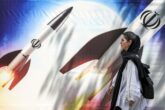December 16, 2022
A Democratic Iran Is Coming and It Will Lead the Middle East
A 44-year epoch in the greater Middle East may be coming to an end, as the region begins to turn on its axis. In early 1979, a radical Islamic regime under Ayatollah Ruhollah Khomeini toppled Shah Mohammed Reza Pahlavi in Iran, spreading revolutionary turmoil throughout the Levant and challenging the conservative Gulf Arab monarchies. The region was never the same, as Iranian-backed militias aggravated existent civil wars and started new ones.
Domestically, Iran has spent the past few decades as a bleak, repressed and relatively impoverished society. Henry Kissinger told me that had the Pahlavi dynasty remained in power, Iran, given its strong state and civilizational richness, would have evolved into a constitutional monarchy with an economy comparable to South Korea’s.
Because Iran constitutes the Middle East’s geopolitical pivot point, nothing has the potential to change the region as much as a more liberal regime there
Now, the regime has been rocked by months of widespread protests against wearing the hijab, unrest cutting across economic, educational and regional divisions. Cracks are starting to appear in the Islamic Republic’s power structure. Because Iran constitutes the Middle East’s geopolitical pivot point, nothing has the potential to change the region as much as a more liberal regime there in the coming months or years.
Whereas many Arab countries that fell into chaos during the Arab Spring have artificial borders drawn by Europeans — rather than being strong historical states, they are merely vague geographical expressions — there is nothing artificial about Iran. With a highly educated population of 85 million, larger than any Arab country save for Egypt, Iran is synonymous with the Iranian plateau, one of the region’s critical geographical features. The plateau overlooks and influences Mesopotamia to the west and Central Asia to the northeast.
Read the full article from Bloomberg.
More from CNAS
-
Don’t Trust Russia to Mediate the Iran Nuclear Deal
Preventing an Iranian nuclear weapon is of critical importance to U.S. security and the security of Israel and partners throughout the Middle East....
By Jonathan Lord
-
Iraq’s Population Grows to 46 Million People Following Nationwide Census
Iraq’s population now stands at 46 million people following a nationwide census that was held in November of 2024. The census, the first in 40 years, has been billed as a succ...
By Hamzeh Hadad
-
Gaza After Hamas
To permanently remove Hamas from power, the United States must work alongside its Arab and Israeli partners to support the PA’s return to Gaza....
By Delaney Soliday
-
Sharper: Iran and the Axis of Upheaval
Despite suffering geopolitical setbacks since Hamas’s October 7 attacks on Israel, a potentially nuclear Iran continues to pose a significant threat to U.S. and allied interes...
By Delaney Soliday & Charles Horn




